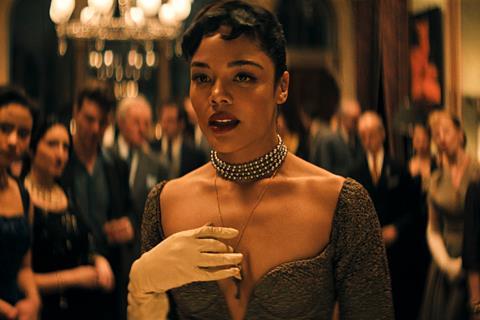DaCosta updates Henrik Ibsen’s classic play ’Hedda Gabler’ to a modern dinner party setting

Dir: Nia DaCosta. US. 2024. 107mins
It’s going to be a bumpy night for the attendees of the lavish party at the centre of Hedda, Nia DaCosta’s elegant but uneven adaptation of the Henrik Ibsen play. Tessa Thompson is a wickedly calculating Hedda Gabler, who is juggling several schemes over the long evening. But despite some choice supporting performances and a gender flip for one of the play’s crucial characters, Hedda’s wry wit flags before the raucous festivities do.
Hedda Gabler’s desperation, despair and ambition get a bit lost in translation
Screening as a Toronto Special Presentation, the period drama will head to London before opening in select US theatres on October 22 and streaming on Prime Video from October 29. The film represents a reunion between Thompson and DaCosta after the director’s 2018 debut Little Woods. A tart literary adaptation, Hedda doesn’t seem a likely awards contender, but arthouse viewers might be interested in an adaptation that’s sexier and more contemporary.
Set in 1950s England, Hedda stars Thompson as the titular bohemian who feels stifled by her marriage to stuffy academic George (Tom Bateman). Throwing an extravagant soiree at the gorgeous country house they may not be able to afford much longer, Hedda hopes to secure a prize promotion for George that could guarantee their financial future. But also attending the party is George’s chief rival for the job, the brilliant author Eileen (Nina Hoss), with whom Hedda once had a passionate affair.
Those familiar with Ibsen’s classic 1890 work will notice several alterations to the text — the most crucial being that the time period and locale have changed, and that George’s professional competitor is no longer a man. As a result, DaCosta centres this story on women who are repressed in different ways, including Eileen’s current lover Thea (Imogen Poots), a meek soul who fled her husband to be with Eileen.
Over the course of four features, DaCosta has demonstrated a welcome desire to try different genres, going from the regional drama of Little Woods to the smart horror remake Candyman to the Marvel picture The Marvels. (Next up will be 2026’s 28 Years Later: The Bone Temple.) Hedda lets her have fun with beautiful costumes, cutting dialogue and an air of upper-class sophistication that’s at odds with the cattiness of the characters. The film is impressive on a technical level, with Sean Bobbitt’s handsome images and Hildur Gudnadottir’s jazzy, percussive score amplifying the classy setting in which Hedda and her fellow combatants will square off.
Thompson is all sly seduction and cold calculation as the story’s master manipulator. Whether courting the flirtatious Judge Brack (a richly measured Nicholas Pinnock) or strategising with her ineffectual husband, Hedda walks into every room and instantly sizes up its occupants to determine who can help her. Only when Eileen arrives does Hedda finally encounter someone who gives her pause, the fire of their past affair still burning inside both women. Thompson lends a slinky confidence to the character, who cannot fully set aside her regret at giving up her freedom for a safe marriage.
Hoss spars deliciously with her co-star, the two actresses trading jabs without ever raising their voices. DaCosta, who penned the adaptation, envisions their sultry bond as symptomatic of a sexist, heteronormative society that forces them to shed parts of themselves in order to be accepted. Hoss plays Eileen with an abundance of resignation, a woman who sees Thea as a possible future while feeling betrayed by Hedda’s surrender to domesticity. When Hedda works behind the scenes to ruin Eileen during this long, drunken night, Hoss impressively rages as the film dramatises another example of women undermining other women to get ahead.
Unfortunately, no matter the initial electricity DaCosta brings to the material, the crackle gradually starts to wane, the momentum diluted by extraneous subplots and slack pacing. Hedda aspires to a modern sensibility, incorporating oral sex and Roxy Music’s ‘Love Is The Drug’ into the narrative — although, not at the same time — to shake away the cobwebs of a renowned older literary work. But as commanding as Thompson is, her Hedda eventually feels more like an attitude than a fully realised character. Amidst this adaptation’s superficial verve, the depth of Hedda Gabler’s desperation, despair and ambition get a bit lost in translation.
Production companies: Plan B, Once And Future
Worldwide distribution: Prime Video
Producers: Dede Gardner, Jeremy Kleiner, Gabrielle Nadig, Nia DaCosta, Tessa Thompson
Screenplay: Nia DaCosta, based on the play Hedda Gabler by Henrik Ibsen
Cinematography: Sean Bobbitt
Production design: Cara Brower
Editing: Jacob Schulsinger
Music: Hildur Gudnadottir
Main cast: Tessa Thompson, Imogen Poots, Tom Bateman, Nicholas Pinnock, Nina Hoss















![[L-R]: Amanda Villavieja, Laia Casanovas, Yasmina Praderas](https://d1nslcd7m2225b.cloudfront.net/Pictures/274x183/6/4/1/1471641_pxl_20251224_103354743_618426_crop.jpg)








